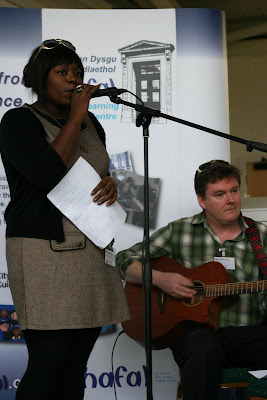
Between social activities I have been reading the final volume of A N Wilson's history of modern Britain Our Times, which covers the coronation of the present Queen up to Gordon Brown's government. Deeply depressing stuff. Wilson skewers what he sees as a succession of charlatans and half-wits who have dominated the UK's political and social establishment in our times.
I don't agree with all that he says and there are some spectacular inaccuracies. His two pages on Welsh devolution are hopelessly wrong. He says that following his success in the 1966 by-election Gwynfor Evans lost to the Tories in the following election (he lost to Labour); more egregiously he suggests that Rhodri Morgan was Blair's placeman to be the first First Minister - it was of course Alun Michael and Rhodri, whom Blair couldn't abide, had to fight to supplant him.
However, much of what Wilson says is all too accurate. There is an especially good chapter on mental health which describes the familiar story of how Enoch Powell as Health Minister (and his successors of both government parties), keen to invest in a range of modern general hospitals, latched on to some trends in psychiatry in order to demolish traditional mental health institutions (to save money) then failed to replace them with modern, community-based services.
Those trends were substantially influenced, as we know, by the repellent patient-abuser R D Laing, the psychiatrist who turned all common sense about mental health on its head - and dealt with the inconvenience of opposition from families and carers by blaming them for causing the problems in the first place.
The extraordinary thing is the extent to which Laing's influence survives to this day where unreconstructed proponents of anti-psychiatry, still stuck in the 1960s, shun the word "illness" to describe such conditions as schizophrenia and continue to refuse to listen to the witness of carers and families.
The problem is that "traditional" psychiatry has also failed to listen to patients and families and so doesn't have the moral authority to challenge all this nonsense. There are excellent psychiatrists about these days - we in Hafal know several - but I do wish they would rigorously redefine their profession's function and their philosophical position on mental illness.
The latest trend among professionals in mental health is at least benign in intent but side-steps the difficult questions about mental illness to concentrate on a wider agenda about the whole population's "well-being". Now, I've no quarrel with a concern for everybody's happiness (though I hope we can all agree that mental health services should not take the lead on that agenda) but the challenge of assisting people with a mental illness remains - and so, therefore, does the need for the mental health charity Hafal.
Wilson usefully contrasts the baleful influence of the opinionated exploiter and "guru" Laing and his gullible followers with his exponentially more humble contemporary Rev Chad Varah who established the Samaritans after presiding at the funeral of a girl who committed suicide. The Samaritans have saved countless lives since.
And what distinguishes the Samaritans? (1) They were not set up by - or even influenced by - mental health services, and (2) Their entire approach is based on listening to people. Work it out - the two points are connected.









































